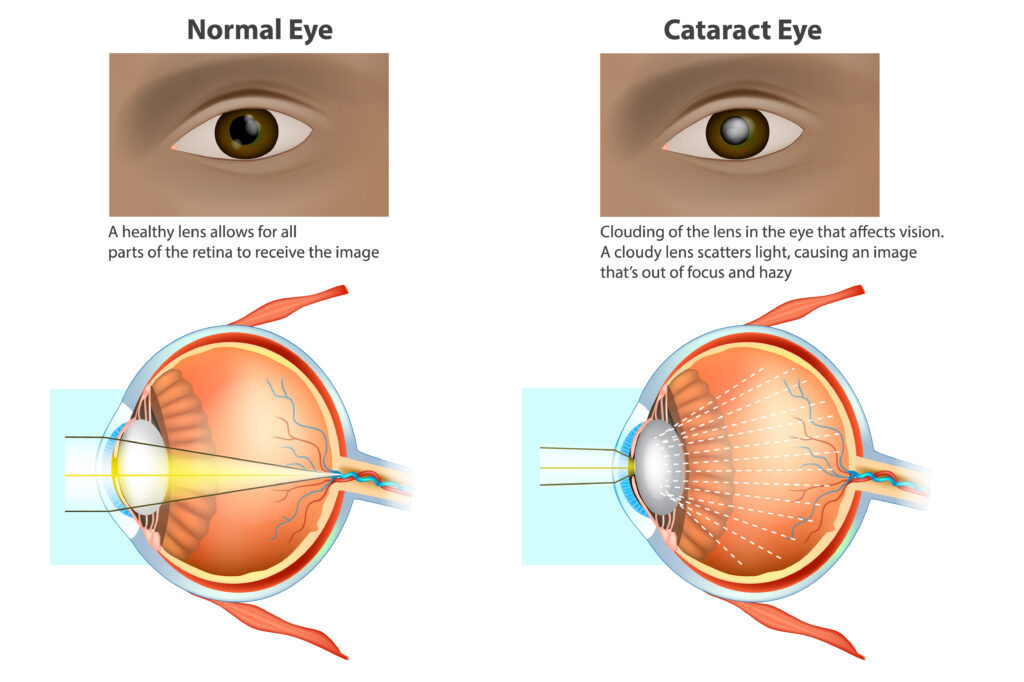A 68-year-old patient presents to the clinic with complaints of gradually worsening vision. Upon examination, the nurse notes that the patient has difficulty seeing at night, increased sensitivity to glare, and a noticeable cloudiness in the lens of the eyes. Which clinical manifestation is most indicative of cataracts?
Cloudiness in the lens of the eyes
Double vision in one eye
Eye pain and redness
Sudden loss of vision
The Correct Answer is A
Choice A Reason:
Cloudiness in the lens of the eyes is the hallmark symptom of cataracts. Cataracts cause the lens to become opaque, leading to blurred vision and difficulty seeing clearly. This cloudiness can make it challenging to perform everyday tasks and is the most indicative sign of cataracts.
Choice B Reason:
Double vision in one eye can occur with cataracts, but it is not the most indicative symptom. While cataracts can cause visual disturbances, the primary symptom is the cloudiness of the lens, which directly impacts vision clarity.
Choice C Reason:
Eye pain and redness are not typical symptoms of cataracts. These symptoms are more commonly associated with other eye conditions such as infections or glaucoma. Cataracts primarily cause visual disturbances without significant pain or redness.
Choice D Reason:
Sudden loss of vision is not characteristic of cataracts. Cataracts develop gradually over time, leading to a slow progression of vision impairment. Sudden vision loss is more likely to be associated with acute conditions such as retinal detachment or vascular occlusions.

Nursing Test Bank
Naxlex Comprehensive Predictor Exams
Related Questions
Correct Answer is ["B","C"]
Explanation
Choice A Reason:
Administering diuretics to increase urine output is not appropriate in this scenario. Diuretics would exacerbate dehydration and further increase serum sodium levels by promoting additional water loss. This approach would worsen the patient’s condition rather than improve it.
Choice B Reason:
Administering desmopressin is a suitable intervention for this patient. Desmopressin is a synthetic analog of vasopressin (antidiuretic hormone) and is used to treat conditions like diabetes insipidus, which can cause symptoms such as excessive thirst, frequent urination, and dehydration. Desmopressin helps to reduce urine output and correct the imbalance of fluids and electrolytes.
Choice C Reason:
Administering intravenous hypotonic saline is appropriate for managing high serum sodium levels and dehydration. Hypotonic saline helps to lower serum sodium levels by diluting the blood and rehydrating the patient. This intervention addresses both the dehydration and the electrolyte imbalance effectively.
Choice D Reason:
Restricting fluid intake to reduce urine output is not appropriate in this case. Fluid restriction would worsen dehydration and could lead to further complications. The patient needs adequate fluid replacement to correct the dehydration and normalize serum sodium levels.
Choice E Reason:
Administering hypertonic saline is not suitable for this patient. Hypertonic saline would increase serum sodium levels further, exacerbating the hypernatremia. This intervention would be counterproductive and could lead to severe complications.
Correct Answer is B
Explanation
Choice A Reason:
Night blindness, or difficulty seeing in low light, is not a primary symptom of macular degeneration. This condition primarily affects the macula, the central part of the retina responsible for sharp, central vision. Night blindness is more commonly associated with conditions like retinitis pigmentosa or vitamin A deficiency.
Choice B Reason:
Central vision loss is the hallmark of macular degeneration. This condition leads to the deterioration of the macula, causing blurred or lost central vision while peripheral vision remains intact. Patients often report difficulty reading, recognizing faces, and performing tasks that require fine visual detail3.
Choice C Reason:
Peripheral vision loss is not typically associated with macular degeneration. This condition affects the central part of the retina, leaving peripheral vision largely unaffected. Peripheral vision loss is more commonly seen in conditions like glaucoma.
Choice D Reason:
Double vision, or diplopia, is not a characteristic symptom of macular degeneration. This condition affects the clarity of central vision but does not typically cause double vision. Double vision can result from issues with the eye muscles or nerves, such as in cases of strabismus or cranial nerve palsies.
Whether you are a student looking to ace your exams or a practicing nurse seeking to enhance your expertise , our nursing education contents will empower you with the confidence and competence to make a difference in the lives of patients and become a respected leader in the healthcare field.
Visit Naxlex, invest in your future and unlock endless possibilities with our unparalleled nursing education contents today
Report Wrong Answer on the Current Question
Do you disagree with the answer? If yes, what is your expected answer? Explain.
Kindly be descriptive with the issue you are facing.
